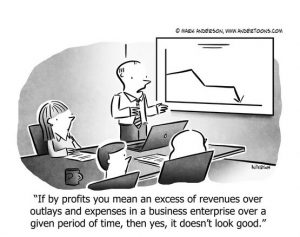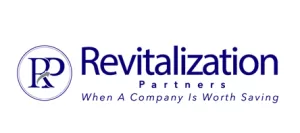 Many equate the success of a company to its reported profits. While profits are good, they do not represent the financial standing of any given company.
Many equate the success of a company to its reported profits. While profits are good, they do not represent the financial standing of any given company.
It is quite possible for a company to report profits while at the same time being on its way to going out of business. It’s also possible for a company to be profitable but not being able to grow, secure financing or attract investors.
There are several reasons why cash flow is a better indication of a company’s financial health.
EASY TO MANIPULATE …
Profit numbers are easier to manipulate as they often include such non-cash items as depreciation or goodwill write-offs.
 Under generally accepted accounting principles (GAAP) businesses can use non-cash expenses such as depreciation and amortization to offset large capital expenses.
Under generally accepted accounting principles (GAAP) businesses can use non-cash expenses such as depreciation and amortization to offset large capital expenses.
While in most cases, investors and bankers will focus on earnings before interest, taxes, depreciation and amortization (EBITDA), these items, while improving profit, can also represent the usage of large amount of cash, impacting the ability of a company to continue to operate.
A STRAIGHTFORWARD REPORT …
Cash flow statements, on the other hand, provide a more straightforward report of the cash available to the company. While a company can appear profitable “on paper”, it may not have sufficient cash to replenish its inventory or pay its immediate operating expenses such as rent, utilities or payroll.
For example, if a company cannot purchase new inventory, eventually it will not be able to generate new sales. If a company cannot afford its operating expenses, it will eventually go out of business. Either way, “Cash is King” in keeping a business alive.
PROFITS ARE BASED ON …
 Another important consideration is that profits are based on sales income.
Another important consideration is that profits are based on sales income.
The main issue here is that recorded revenue is often greater than the amount of actual cash received from sales.
When sales are on credit, the receivable period can often be two or three months. Or, in some cases, never.
This means that a company needs to have sufficient cash on hand or a viable line of credit to both float the operation for the length of the receivable period and to absorb the write-offs on bad receivables.
RECEIVABLES vs. PAYABLES …
 In most cases it is likely that a company also makes its purchases on credit. In this case, accounts payable become another important factor to consider.
In most cases it is likely that a company also makes its purchases on credit. In this case, accounts payable become another important factor to consider.
To be sustainable, a business must pay close attention to its cash cycle and make sure to be able to cover the cash gap between receivables and payables. If a business runs out of cash and/or credit, operations will simply cease.
Assuming that a business has enough cash to maintain its current level of operations, most businesses will want to grow their operations. If cash is king in sustaining ongoing operations, it becomes even more important when considering expansion.
DEPLETION OF CASH …
Sales growth is positive unless it results in the total depletion of cash. Companies should prepare for cash outlays to fund the expansion, especially since cash outflows probably exceed cash inflows during the initial phase of a growth cycle.
Businesses may assume that securing commercial financing will solve the growth dilemma. But lenders expect regular payment on the financing they provide. As such, lenders rely on a company’s current and projected cash flows to determine if the company can afford the additional debt.
PPP LOANS …
 When dealing with PPP loans, it is easy to misconstrue a company’s cash flow position. As the PPP loan is used and forgiven, the expenses that were covered by the PPP loan now become part of a company’s general operating expenses.
When dealing with PPP loans, it is easy to misconstrue a company’s cash flow position. As the PPP loan is used and forgiven, the expenses that were covered by the PPP loan now become part of a company’s general operating expenses.
If a company has other commercial lines of credit or term loans, the use of PPP funds may have made the payments on that debt easier to make.
Cash flow projections must take that into consideration far enough in advance to provide certainty of sufficient funds to continue to make these payments.
Overall, understanding a company’s cash situation is critical to making sound business decisions. Managers of a business must understand and always be in touch with the cash aspect of the business regardless of the profits reported.
Revitalization Partners specializes in improving the operational and financial results of companies and providing hands-on expertise in virtually every circumstance, with a focus on small and mid-market organizations. Whether your requirement is Interim Management, a Business Assessment, Revitalization and Reengineering or Receivership/Bankruptcy Support, we focus on giving you the best resolution in the fastest time with the highest possible return.



